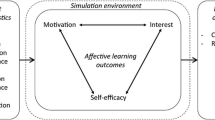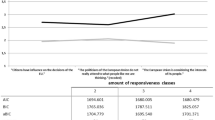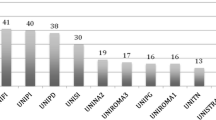Abstract
In recent years, a growing body of literature has widely investigated the impact of role-playing simulations in teaching politics and international relations. While scholars agree that participating in simulations is helpful for the students in developing their skills, the evidence about benefits is more mixed. Moreover, the question whether all students—regardless of their demographic or academic background—benefit similarly from simulations remains largely unanswered. This article, based on a cross-national survey submitted to students from Italy and the Netherlands who have participated in the Model United Nations (MUN), provides an innovative contribution to the current literature by looking at views and opinions of students coming from different educational contexts. Our empirical results suggest that students perceive that MUN increases their skills regardless of their academic and socio-demographic background. The quantitative analysis, based on OLS regression models, reveals that the individual students’ background does not influence their perceived benefit, nor their enjoyment of the experience. MUNs appear to be educational as well as fun for all students, regardless of their age, gender, field of study, seniority, and academic homeland.


Similar content being viewed by others
Notes
For a clear distinction between simulations, role-plays, and games, see Duchatelet et al. (2018). In line with the authors, ‘because students incorporate the role of a specific actor in a predefined situation, we define such [as the Model United Nations—MUN] simulations as role-playing simulations’ (2018, 602).
For a recent critical perspective on the still limited use of simulations in classroom, see Kollars and Rosen (2016).
For a definition of critical thinking, see Bok (2006). It is worth noticing how the improvement in students’ critical thinking is one of the main goals of the Model United Nations. See: https://www.nmun.org.
Duchatelet et al provide a useful review of the definitions of ‘learning outcomes’ provided by education research. The authors mainly distinguish among cognitive outcomes (which are viewed as the ‘results of those thinking activities that directly lead to learning in terms of knowledge, understanding, skills and so on’), affective outcomes (which are defined as the ‘results of feelings that arise during learning,’ such as motivation), and finally regulative learning outcomes (which attain at ‘the ability to monitor the learning process,’ even by adjusting it to achieve specific goals) of a simulation (Duchatelet et al 2018, 603–604). On this point, see also Vermunt and Vermetten (2004).
The authors are available to provide additional information on the survey upon requests.
The ratio behind grouping students is the following: students who are enrolled in courses that have in their curricula subjects and examinations related to the themes tackled in the simulation (namely Political Science, International Relations, and Public Administration) and students who are enrolled in courses that do not present such subjects and examinations.
As explained in the previous paragraph, these variables refer to the students’ self-perception of skills improvement, with a risk—albeit minimal, considering the students of our sample—of self-evaluation biases (Kruger and Dunning 1999).
If we consider the 30 coefficients identified by our five IVs in six models (6 * 5 = 30), it is fair to claim that only four statistically significant effects (of which, two at 90%, one at 95% and one at 99%) are not enough to falsify our hypothesis H1b.
References
Asal, V. 2005. ‘Playing Games with International Relations. International Studies Perspectives 6 (3): 359–373.
Asal, V., and J. Kratoville. 2013. Constructing International Relations Simulations: Examining the Pedagogy of IR Simulations Through a Constructivist Learning Theory Lens. Journal of Political Science Education 9 (2): 132–143.
Baranowski, M.K., and K.A. Weir. 2015. Political Simulations: What We Know, What We Think We Know, and What We Still Need to Know. Journal of Political Science Education 11 (4): 391–403.
Bok, D. 2006. Our Underachieving Colleges. Princeton: Princeton University Press.
Brunazzo, M., and P. Settembri. 2012. Experiencing the European Union: Learning How EU Negotiations Work Through Simulation Games. Soveria Mannelli: Rubbettino.
Butcher, C. 2012. Teaching Foreign Policy Decision-Making Processes Using Role-Playing Simulations: The Case of US–Iranian Relations. International Studies Perspectives 13 (2): 176–194.
Calossi, E., and F. Coticchia. 2018. Students’ knowledge and perceptions of International Relations and the ‘Model United Nations’. An empirical analysis. Acta Politica 53 (3): 409–428.
Coticchia, F., E. Calossi, and L. Cicchi. 2020. A Reality Check for Students? How Participating in the Model United Nations Influences Skills, IR Perceptions and Perspectives on Future Career. Politics 40 (2): 245–261.
Crossley-Frolick, K. 2010. Beyond Model UN: Simulating Multi-level, Multi-actor Diplomacy Using the Millennium Development Goal. International Studies Perspectives 11 (2): 184–201.
Davesa, F., and S. Piros. 2019. Assessing the Effectiveness of EU Simulations: Do the Characteristics of Participants Impact Learning Outcomes? European Political Science 18: 535–553.
Duchatelet, D., P. Bursens, V. Donche, D. Gijbels, and P. Spooren. 2018. Teaching and Learning. Student Diversity in a Cross-continental EU-Simulation Exploring Variation in Affective Learning Outcomes Among Political Science Students. European Political Science 17: 601–620.
Ehrlander, M., and B. Boylan. 2017. The Model Arctic Council: Educating Postsecondary Students on Arctic Issues and Governance Through Simulation. International Studies Perspectives 19 (1): 83–101.
Giovanello, S., J. Kirk, and M. Kromer. 2013. Student Perceptions of a Role-Playing Simulation in an Introductory International Relations Course. Journal of Political Science Education 9 (2): 197–208.
Glasgow, S. 2014. Stimulating Learning by Simulating Politics: Teaching Simulation Design in the Undergraduate Context. International Studies Perspectives 15 (4): 525–537.
Jones, R., and P. Bursens. 2015. The Effects of Active Learning Environments: How Simulations Trigger Affective Learning. European Political Science 14 (3): 254–265.
Kollars, N., and A. Rosen. 2016. 2016 Bootstrapping and Portability in Simulation Design. International Studies Perspectives 17: 202–213.
Krain, M., and J.S. Lantis. 2006. Building Knowledge? Evaluating the Effectiveness of the Global Problems Summit Simulation. International Studies Perspectives 7 (4): 395–407.
Kruger, J., and D. Dunning. 1999. Unskilled and Unaware of It: How Difficulties in Recognizing One’s Own Incompetence Lead to Inflated Self-Assessments. Journal of Personality and Social Psychology 77 (6): 1121–1134.
Lantis, J. 1998. Simulations and Experiential Learning in the International Relations Classroom. International Negotiation 3 (1): 39–57.
Lohmann, R. 2019. Effects of Simulation-Based Learning and One Way to Analyze Them. Journal of Political Science Education. https://doi.org/10.1080/15512169.2019.1599291.
McIntosh, D. 2001. The Uses and Limits of the Model United Nations in an International Relations Classroom. International Studies Perspectives 2 (3): 269–280.
Meschoulam, M., A. Muhech, T. Naanous, S. Quintanilla, R. Aguilar, J. Ochoa, and C. Rodas. 2019. The Complexity of Multilateral Negotiations: Problem or Opportunity? A Qualitative Study of Five Simulations with Mexican Students. International Studies Perspectives 20 (3): 265–286.
National Model UN. 2019. By The Numbers. Available at https://www.nmun.org/about-nmun/by-the-numbers.html. Accessed on September 3, 2019.
Obendorf, S., and C. Randerson. 2013. Evaluating the Model United Nations: Diplomatic Simulation as Assessed Undergraduate Coursework. European Political Science 12 (3): 350–364.
Orr, S.K., and C. Buhr. 2019. International Negotiations and State Interests: A Green Climate Fund Simulation. Journal of Political Science Education. https://doi.org/10.1080/15512169.2019.1579652.
Parrin, A. 2013 The Dog-Eat-Dog World of Model U.N. The New York Times, available at https://www.nytimes.com/2013/08/04/education/edlife/a-new-student-run-breed-crisis-oriented-and-fiercely-competitive.html?module=inline. Accessed on September 5, 2019.
Pettenger, M., D. West, and N. Young. 2013. Assessing the Impact of Role-Play Simulations on Learning in Canadian and US Classrooms. International Studies Perspectives 15 (4): 1–18.
Raymond, C. 2010. Do Role-Playing Simulations Generate Measurable and Meaningful Outcomes? A Simulation’s Effect on Exam Scores and Teaching Evaluations. International Studies Perspectives 11 (1): 51–60.
Ripley, B.A., N.B. Carter, and A.K. Grove. 2009. League of Our Own: Creating a Model United Nations Scrimmage Conference. Journal of Political Science Education 5 (1): 55–70.
Shannon, V.P. 2019. Role-Play Simulations and Changing Perceptions of the Other: Model UN, Model Arab League, and Student Views of the Muslim World. International Studies Perspectives. https://doi.org/10.1093/isp/ekz011.
Shellman, S., and K. Turan. 2006. Do Simulations Enhance Student Learning? An Empirical Evaluation of an IR Simulation. Journal of Political Science Education 2 (1): 19–32.
Starkey, B., M.A. Boyer, and J. Wilkenfeld. 2015. International Negotiation in a Complex World. Lanham: Rowman and Littlefield.
Taylor, K. 2013. Simulations Inside and Outside the IR Classroom: A Comparative Analysis. International Studies Perspectives 14 (2): 134–149.
Toomey, M., Xinhe Zhou, and Xin Yan. 2019. Examining the Effectiveness of Using Role-Play Simulations with Chinese Students in China. International Studies Perspectives. https://doi.org/10.1093/isp/ekz014.
Vermunt, J., and Y. Vermetten. 2004. Patterns in Student Learning: Relationships Between Learning Strategies, Conceptions of Learning, and Learning Orientations. Educational Psychology Review 16 (4): 359–384.
Weidenfeld, M., and K. Fernandez. 2017. Does Reacting to the Past Increase Student Engagement? An Empirical Evaluation of the Use of Historical Simulations in Teaching Political Theory. Journal of Political Science Education 13 (1): 46–61.
Wunische, A. 2019. Lecture Versus Simulation: Testing the Long-Term Effects. Journal of Political Science Education 15 (1): 37–48.
Youde, J. 2008. Crushing Their Dreams? Simulations and Student Idealism. International Studies Perspectives 9 (3): 348–356.
Acknowledgements
The authors wish to thank Lorenzo De Sio and Laura Neack for their contribution during the various stages of this research. A special acknowledgement goes to association ‘Consules’ in Rome, without which the implementation of the survey would have not been possible.
Author information
Authors and Affiliations
Corresponding author
Additional information
Publisher's Note
Springer Nature remains neutral with regard to jurisdictional claims in published maps and institutional affiliations.
Rights and permissions
About this article
Cite this article
Cicchi, L., Calossi, E., Onderco, M. et al. I love this game: the interplay between experience and background in role-playing simulations: insights from MUN participants in Italy and the Netherlands. Eur Polit Sci 20, 397–412 (2021). https://doi.org/10.1057/s41304-020-00277-8
Published:
Issue Date:
DOI: https://doi.org/10.1057/s41304-020-00277-8




